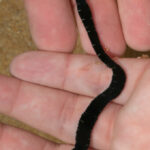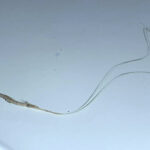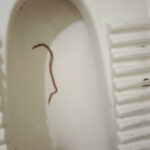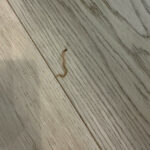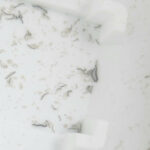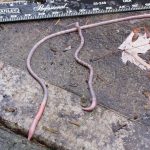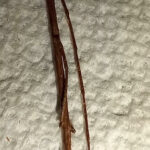Did you know that one of the smallest snakes in the world is so small that most people mistake it for a worm? At first glance, most people think that this snake, found mostly in Africa and Asia, is an earthworm. A closer look will reveal that what appears to be a worm has slick skin and no segments at all. The technical name for this snake is “Ramphotyphlops braminus,” but it has many other names including: brahminy blind snake, brahminy blindsnake (spelling), common blind snake, Nilgiri worm, Hawaiian blind snake, Perrotet’s shieldtail snake, island blind snake, and flowerpot snake. In addition to Africa and Asia, Ramphotyphlops braminus can be found in Australia and the Americas.
Ramphotyphlops braminus earned the name “flowerpot snake” because they have managed to make their way to other parts of the world through the plant trade. They typically live in urban and agricultural areas, burrowing their way into the ground to live in termite and ant nests. They also feed on pupae of ants and termites as well as eggs and larvae. You can also find flowerpot snakes in moit leaves, under logs, wet forest, and in city gardens. Flowerpot snakes thrive in humidity and warm temperatures.
Adults are small, thin, and shiny silver gray, charcoal gray, or purple. The head and tail-tip are indistinct, the neck is not narrow and the eyes are only small dot-like remnants under the scales. The tail is tipped with a tiny pointed spur. The head scales are small and similar to body scales. The belly is grayish to brown. The scales are smooth and shiny. There are 14 dorsal scale rows along the entire body. Juvenile coloration is similar to that of adults. Source: Florida State Museum of Natural History: http://www.flmnh.ufl.edu/herpetology/FL-GUIDE/Ramphotyphlopsbraminus.htm.
The flowerpot snake grows anywhere from 2.5-6.5 inches and all members of the species are female. The female flowerpot snake may lay eggs of have live births and the snake is not harmful to humans or the environment. Because the flowerpot snake is harmless, there is no need for extermination. If you have an infestation, which is highly unlikely, and you feel the need to trap the snakes, glueboards are effective. It is important to note that glueboards are considered inhumane. If the snakes are in your flowerpots, simply place the pot outside and allow the snake to make its way into the earth. Flowerpot snakes will do anything to avoid humans, so you don’t have to worry about contact.
Flowerpot Snake’s Favorite Places
In Africa, it has been reported in Benin, Togo, Ivory Coast, Cameroon, Somalia, Zanzibar, coastal Tanzania, Mozambique, South Africa (an isolated colony in Cape Town), Madagascar, the Comoro Islands, Mauritius, the Mascarene Islands, and the Seychelles.
In Asia it occurs in Arabia, Iran, Pakistan, Nepal, mainland India, the Maldives, the Lakshadweep Islands, Sri Lanka, Bangladesh, the Andaman Islands, the Nicobar Islands, Myanmar, Thailand, Laos, Cambodia, Vietnam, the Ryukyu Islands of Okinawashima and Miyakoshima, Taiwan, Hong Kong, southern China, Hainan, the Malay Peninsula, the Maritime Southeast Asia including Singapore, Sumatra and nearby islands (the Riao Archipelago, Bangka, Billiton and Nias), Borneo, Sulawesi, the Philippines, Butung, Salajar, Ternate, Halmahera, Buru, Ceram, Ambon, Saparua, Java, Bali, Lombok, Sumbawa, Madura, Flores, Lomblen, Sumba, Timor, Kai Island, the Aru Islands, New Guinea (Irian Jaya and Papua New Guinea), New Britain and Bougainville Island. In Australia in the Northern Territory near Darwin and the northern tip of Queensland). It occurs in the Cocos (Keeling) Islands, on Christmas Island, Palau, Guam, Siapan and the Hawaiian Islands. The Americas in the United States (Massachusetts and Florida), western and southern Mexico and Guatemala. This also the only snake reported from Lakshadweep Islands.
Source: Wikipedia.org, http://en.wikipedia.org/wiki/Ramphotyphlops_braminus#Common_names
All About Worms is always free, always reader-supported. Your tips via CashApp, Venmo, or Paypal are appreciated! Receipts will come from ISIPP Publishing.



